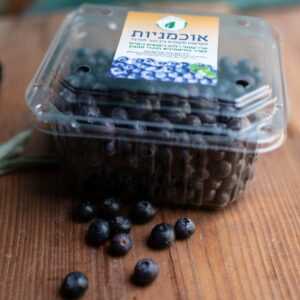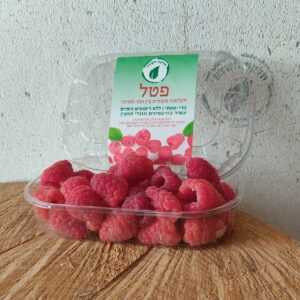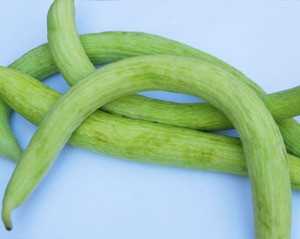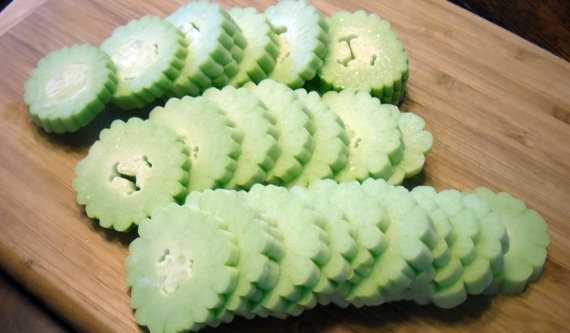BERRY, BERRY GOOD NEWS:
FRESH, DELICIOUS RASPBERRIES (PETEL) ARE JOINING THE BLUEBERRIES!
RASPBERRIES: 20 NIS per 125-gram package.
Quantities are limited for now, until the yield increases.
BLUEBERRIES: 16 NIS per 125-gram package; 60 NIS per half-kilo package
ORDER THESE DELECTABLE BERRIES TODAY VIA OUR ORDER SYSTEM!
____________________________________________________
Over the last few weeks, we began harvesting our first beds of fakus, aka “Arabic cucumber.” For years, this event was followed by messages from you like, “This week I received two portions of zucchini (or cucumbers) in my box!” Thus, this year we hope to introduce those unfamiliar with the wonderful fakus, and ease its recognition by those in the know, by distributing the fakus alongside its cousins the zucchini and cucumber. (For now, the beginning of the fakus harvest, not all boxes will receive them.)
To properly meet the fakus and easily distinguish him from the zucchini, here’s what I learned from our longtime client Tzipi from Jerusalem: the fakus stem resembles that of a cucumber, not zucchini! If you received a light-colored elongated vegetable that kind-of-resembles-zucchini-but-kind-of-doesn’t, check out its stem (the part where it attached to the plant): if it is wide and star-shaped like a zucchini, well… it’s a zucchini. If it’s thin and willowy like a cucumber, then say hi to our friend the fakus.
Here, ladies and gentlemen, is the fakus in all its glory:
At the heat of the day in the scorching Sinai desert, the Israelites craved the Egyptian fare, reminiscing, “We remember the … zucchini and the melons…” (Numbers 11, 5). The “zucchini” they missed was most probably the fresh fakus. And to be honest, I totally understand them. Fakus is definitely worth pining away for. Thus, every summer, we descendants of those Egyptian exiles are proud to bring to you the vegetable hankered by our great-great-great-great-great-great-greeeaaaaaat-grandparents….
Tiberius Julius Caesar Augustus was known for his fondness for cucumbers. However…Tiberius was probably not munching on the cucumber we all know and love, i.e., the Cucumis Sativus, but rather on the long, light-skinned fakus. Tiberius would eat fakus every day of the year, necessitating the Roman farmers to evidently develop artificial methods to grow the vegetable year-round.
According to Pliny the Elder’s encyclopedia Historia Naturalis, “Indeed, he [Tiberius] never lacked for it [fakus], for he had raised beds made in frames upon wheels, by means of which the plants were moved and exposed [in summer] to the full heat of the sun; while, in winter, they were drawn indoors and placed under the protection of frames glazed with mirror-stone.”
And in the spirit of confusion and surprises for today: The fakus is neither a zucchini or a cucumber. From the botanical point of view, it is actually…a melon! Cucumis melo var. flexuosus melon, to be exact. (The fakus is also coined the “snake melon,” on account of its looks.) Still, it is similar to a cucumber because we do not let the fakus mature like our melons. Instead, we pick it in its crunchy sweet youth, like cucumbers (which is a good thing, really, because the fakus would mature into a really bad melon…)
Melons and cucumbers belong to the same extended family, but they are two different entities indeed. When you look at the leaves of the plants, the difference is obvious: fakus and melon leaves are rounder and less jagged than cucumber leaves. The flavor and appearance of the fakus are similar to the cucumber, but not really: the fakus is covered with soft fuzz and is sweeter and crunchier than the cucumber. However, like the cucumber, it is picked in its youth, before its seeds mature, which is why it is not as soft as a melon. Different fakus varieties grown round the world include light green, striped, long and curved, or short like a cucumber.
The fakus (like the cucumber) sometimes tends to be bitter. Various attempts to overcome this bitterness have proven that we must carefully choose the plants whose seeds are to be kept for next year, making certain that they are non-bitter plants. After many long years of Chubeza’s careful seed selection, we hope you will not encounter a bitter fakus. But to be on the safe side, when you slice one into a salad, first nibble at the point where the fakus was attached to the plant. The bitterness starts there. If you like what you taste, slice away! If it’s bitter, take a bite further down. Usually, the bitterness is confined only to the very end…
The fakus is lauded by chefs as part of the trend to return to local, homegrown “baladi” food of the past, and the Internet abounds with nice, interesting fakus recipes. It is indeed an ancient veggie, eaten with gusto in the Middle East prior to the arrival of the garden cucumber. Several years ago, we were visited by Dr. Moshe Ra’anan, author of numerous articles dealing with plants and animals in Jewish sources. He photographed our nice fakus varieties and wrote a few words about them (in Hebrew). I learned from him that during the Mishnaic period there was actually a verb “to fakus” (“לפקס”), related to the ripening of the fakus. Our commentators offered two different interpretations for its definition: 1. the stage at which the fuzz is shed from the fruit, or 2. the stages at which the flower dries up and falls from the fruit.
Either way, when the fakus is fakused, you can rinse, slice, sprinkle with salt if desired and joyfully bite into it, or you may preserve it, just like a cucumber, producing delicious pickles, and even cook or fry it like a zucchini. (Despite the fact, as noted, that it is…a melon, after all!)
Confused? No problem! Just enjoy the fakus. Bon Appetite! As one of the vegetables that grows only in Spring, the amazing fakus is only with us for a short time, so enjoy!!!
May this be a week that brings good news!
Alon, Bat-Ami, Dror, Einat and the entire Chubeza team
_________________________________________
WHAT’S IN THIS WEEK’S BOXES?
Monday: Scallions/celery stalk/bunch of turnips, fakus/bell peppers/eggplant, lettuce, red beets, zucchini/squash, potatoes, acorn squash/butternut squash/slice of pumpkin/sweet potatoes, parsley/dill/coriander/nana, cherry tomatoes/tomatoes, cucumbers, cabbage/melon. SPECIAL GIFT FOR ALL: Lalique lettuce!
Large box, in addition: Onions, carrots, Swiss chard/kale.
FRUIT BOXES: Red apples/pears, bananas/pomelit/grapefruit, avocados, nectarines/loquats (shesek).
Wednesday: Scallions/celery stalk/bunch of turnips, fakus/bell peppers/eggplant/sweet potatoes, lettuce, red beets, zucchini/squash, potatoes, acorn squash/butternut squash, parsley/dill/coriander, cherry tomatoes/tomatoes, cucumbers, cabbage/melon.
Large box, in addition: Onions, carrots/slice of pumpkin, Swiss chard/nana/basil.
FRUIT BOXES: Red apples/pears, bananas/clemantinot, pomelit/grapefruit/avocados, peach.





